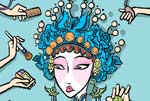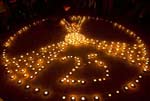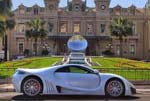Web Comments
Do 'Tiger Moms' make the best parents?
Updated: 2011-04-22 08:56
By Patrick Mattimore (chinadaily.com.cn)
Read Amy Chua's best-selling book Battle Hymn of the Tiger Mother, and it's hard not to react. Tiger Mother has been the subject of numerous commentaries. Chua has appeared publicly many times since the book’s January publication to explain and defend what she wrote.
Tiger Mother describes Chua's Chinese-parenting style raising her daughters, Sophia and Lulu. Chua is a strict parent who set firm guidelines for her daughters. She insisted that her daughters get straight A's in school, practice many hours each day learning a musical instrument- piano or violin, and not watch TV, play video games, or attend sleepovers.
Dr. Chua, a law professor at Yale, was raised by a Tiger Mother. Her mom graduated first in her class from university with a degree in chemical engineering. Although Chua and her siblings excelled in various fields, those accomplishments were never good enough for her mom.
Chua’s father was a world-renowned math professor at Berkeley whom she calls the "black sheep" of his family. He hated his family and never thought about his own mother, except in anger. He left China to attend M.I.T. as an undergraduate and never looked back.
Jed, Chua's husband, is a Jewish Yale law professor.
Sophia, Professor Chua's elder daughter, played a piano recital at Carnegie Hall when she was fourteen and has recently been accepted at Harvard and Yale. Lulu led a prestigious youth orchestra, was accepted as a private violin student by a world-famous teacher from the Julliard School and, of course, got straight A's.
There's no doubt that the genes Chua's daughters inherited set the foundation for their accomplishments. But Dr. Chua would say that a far more important ingredient in her daughters’ success has been the hard work they have put in and, particularly, the parental push she gave them.
Chua insists that her book is not to be read as a how-to parenting book. Further, she claims that she is not suggesting that Chinese mothering is superior to Western-style parenting. In fact, she says that in raising Lulu she learned that she had to pull back from her strict style sometimes. She catalogues her own parental excesses in the book as a means of self-parody.
Still, it's hard to read the book and wonder if in fact the author believes that strict Chinese mothering and a lax Western-style of child-rearing are equally efficacious. The values that she ascribes to Chinese mothering are overwhelmingly positive and the negatives (i.e. humiliating a child) are explained away as a necessary part of the larger love the parent feels for her children. Chinese parents berate their children because to do anything less would be an acknowledgment that they didn't believe the children were capable of more.
Chua dispels her own doubts about her struggles with getting Lulu to practice the violin and piano by giving voice to Lulu in the last chapter. Lulu professes to be glad that Chua forced her to practice. When Chua coerced Lulu to practice a difficult piano piece at the age of seven, denying her dinner, water and bathroom breaks until she got it right, Chua concluded that the child’s eventual success made the deprivations worthwhile.
So what is Chinese mothering and is it superior to Western parenting? Should all moms ascribe to be Amy Chua?
First, Chua is using the terms "Chinese mothers" and "Western parents" loosely. The Tiger Mother/Chinese Mother can be found in many cultures and is not exclusive within any culture. Western parenting, i.e. encouraging a child's individuality/creativity, is not confined to the West and may be becoming a more predominant phenomenon in China, particularly with the adoption of China's family planning policy, which some have concluded is producing more self-centered emperors and empresses.
The Tiger Mother has high expectations for her children and is not afraid to push them. She sets clear goals and does not allow the child to deviate from them or dictate new ones. Tiger moms are consistently involved with their children and, according to studies, spend ten times as long each day as Western moms drilling the kids.
Chinese mothers believe that children won't work naturally at something until they become good at it and that it is the duty of mothers to force the children to work.
To a Tiger Mother, childhood is a training period, an investment in the future.
If a child fails (or doesn't succeed well enough) the Chinese mother believes the answer is that both parent and child must work harder to do better the next time.
Unlike in the West where children are encouraged to experiment and develop their own individual talents, Chinese parents believe the child is an extension of oneself. Chinese parents believe they know what is best for their children and therefore override the child's preferences. Chua concludes that it may come down to a matter of choice. Westerners believe in allowing children a large measure of freedom to choose their own paths while the Chinese parent makes choices for her children.
Trying to untangle Chinese mothering and Western parenting and pick one style of raising a child or the other as the exclusively right way is ultimately a fool's errand. Certainly, there are elements from both that are worth adopting. Parents can be consistent without being inflexible. They can have high expectations and demand that children work hard without setting up gulag conditions. They can listen and adapt to their children without giving up control or responsibility for raising them.
In the final analysis, Amy Chua has provided readers with a provocative memoir about how she raised her daughters. Certainly, her ideas are worth considering and many are worth adopting. However, no parent should believe that Tiger Mothers have infallible blueprints for raising successful children. Parents still need to chart their own course and be prepared to vary the course according to the needs of each child.
Patrick Mattimore is a fellow at the American-based Institute for Analytic Journalism and an adjunct law instructor at Tsinghua/Temple Law School LLM Program in Beijing.
Specials

Peking Opera revival
Traditional opera is enjoying a revival in Beijing thanks to some modern touches.

25 years after Chernobyl
Belarus, Ukraine and Russia will mark the 25th anniversary of the nuclear reactor explosion in Chernobyl.

Luxury car show
The world's most prestigious luxury, sports cars and supercars are displayed in Monaco.